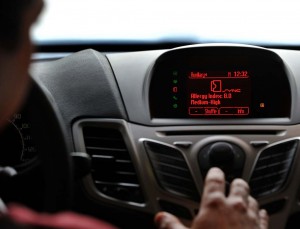
Ford is exploring ways for its Sync infotainment system to provide health information, even monitor chronic disease sufferers.
Ford Motor Co. is looking at ways to expand the services available through SYNC, its in-car information and communications system, possibly using the onboard technology to deliver up-to-date medical information to the driver or passengers – even monitoring the health of allergy or chronic disease sufferers.
“This is still a research project,” said Gary Strumolo, the maker’smanager of design and infotronics. But he said Ford believes a production version of the system could be ready within 12 to 24 months.
Strumolo said Ford is using the wireless Bluetooth connectivity of SYNC to link a car to medical providers like Medtronics. The first application could monitor blood glucose level for diabetics and provide them their vital statistics without having to take their hands off the wheel or eyes off the road.
“If you’re a diabetic, certainly you want to have a continuous knowledge of your condition, but it’s particularly critical if you’re driving, because that can affect your ability to drive, and not only endangers you, but others on the road,” he said
The need is substantial, he said. Nearly 26 million adults and children are currently living with diabetes in the U.S., at least 3 million more than there were four years ago. Numbers grow even higher for asthmatics and allergy sufferers, with the Asthma and Allergy Foundation of America reporting that some 60 million Americans suffer those diseases.
The award-winning Sync system was originally designed to make it possible to use voice or finger-tip commands to operate a vehicle’s audio or navigation system. But Ford has been looking for ways to expand the technology’s potential. It can now help locate the cheapest local gas station, for example, offer up sports cars or even link to smartphone apps, such as the Pandora audio service.
These new health apps could significantly expand SYNC’s line-up of services, the maker stressed, improving people’s lives by giving them access to personal health information even while on the go. It could, for example, deliver information about current conditions around the car to allergy sufferers.
The driver would go to the Pollen.com database to obtain up-to-the-minute information on air quality, which ultimately may change their decision on controlling the climate control settings inside the car.
“Ultimately, if you go on trips you might want to know what the pollen level is where you are (not only) now, but what will it be when you get to your final destination, and that information can be obtained through a connectivity system to the internet,” Strumolo said.
Venkatesh Prasad, Ford’s Senior Technical leader, says engineers are thinking broadly of embracing digital technologies in a holistic way so the automobile can become an integral part of an owners life and lifestyle.
“We’re looking at cars as technology platforms,” he explained. “When the car becomes a technology platform you can then build a whole spectrum of applications on top of that platform.”
Prasad says Ford’s approach to utilizing Sync is disseminating information that consumers want, when they want it.
“We want to make your lives easier, and less stressful, and we do that by giving you the information you want at your convenience and in the privacy of the car, done through vehicle controls in a comfortable convenient manner, without compromising safety,” said Prasad.
The ongoing Ford health and wellness research projects are still in the prototype and research phase, he added.
